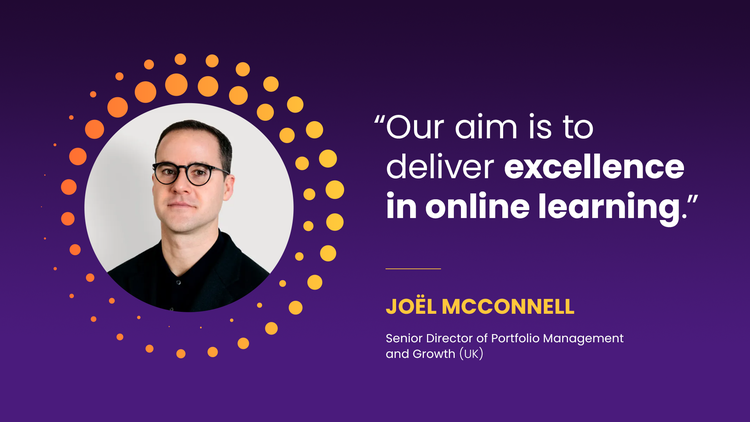Voice of a Leader: Joël McConnell

We recently sat down with Joël McConnell, Senior Director of Portfolio Management and Growth at Boundless Learning to discuss trends and challenges in higher education, the unique needs of UK institutions, and how Boundless Learning can be an indispensable partner.
Joel’s perspective, shaped by his extensive experience in higher education, offers a fascinating look into the future of learning and partnership dynamics. Here’s what he had to say.
“I’ve worked in higher education for the better part of two decades, having taken on my first role in 2008 when I graduated from my MBA programme. I’m originally from Canada, but I moved to Madrid in 2006, and then London in 2019, so I’ve been on this side of the Atlantic for some time now.
Aside from my work at Boundless Learning, I’m also pursuing a PhD at University College London (UCL), focusing on digital transformation in global higher education. More specifically, I’m researching the evolving relationship between online program management (OPM) companies and their academic partners, and especially since the pandemic, when many universities invested significantly in online delivery infrastructure.
At Boundless Learning, I serve as the Senior Director of Portfolio Management and Growth, overseeing academic partnerships in the UK. That includes licensing deals, revenue-share agreements, and collaborating across teams to help institutions achieve their goals in the online learning space.”
“Financial difficulties are, without question, one of the biggest challenges in the UK right now. Around 70% of UK universities are facing financial hardship. Many are being forced to make budget cuts and even implement involuntary redundancies. There’s constant pressure to do more with fewer resources.
Online education is often seen as a potential solution for boosting enrolment numbers, but it comes with its own complexities, such as taxation issues for international students. Many institutions aren’t fully prepared to manage these nuances, despite their ambitions to grow their online programme offerings.
Another hurdle is the hesitancy to invest in digital infrastructure at a time when innovation has never been more critical. I’ve worked with both forward-thinking universities that invested early in this type of essential infrastructure, and other prestigious institutions that were slower to embrace the kinds of solutions that deliver an outstanding learning experience at scale.
Some universities also struggle to put systems in place for the acquisition and retention of learners. Another area that universities aren’t great with is using all their available data to understand the learner and deliver integrated improvements to the entire learner journey.
That's where Boundless Learning can help. We're able to share the cost for that digital delivery and innovation across multiple academic partners, and deliver universities full stack access to Salesforce, for example, in a way that would be difficult to achieve by any individual institution because of the current financial pressure and headcount restrictions many institutions are now facing.”
“There’s historically been some skepticism about the legitimacy of online degrees, but that continues to change. While this perception still exists in some areas of higher education, it’s far less of an issue for the types of learners our university partners aim to engage with, such as working professionals pursuing postgraduate degrees.
As a result of the pandemic, it’s less of a hard sell. People are much more on board with the idea of pursuing advanced studies online in conjunction with other activities, both professional and personal.”
“To me, digital transformation is about the disruption of existing business models, and understanding the role technology plays in facilitating that disruption. Understanding what technologies help facilitate and accelerate change is important, but you also need to keep in mind how the competitive landscape continues to evolve more broadly.
There are many organisations that now provide quality, online, technology-enabled training options that resonate with learners. The source of the content is the big firms where learners might like to work — think, for example, of courses and certificates offered by big tech firms like Google via an open online course provider.
At Boundless Learning, we continuously evaluate how to approach the work we do, and the tools we use to support learners. Our aim is to deliver excellence in online learning and stay ahead of disruptions in how online education is delivered.
AI seems to have staying power, which is why we’re actively deploying AI tools across the service areas we offer our partners and their learners. We’re also enabling our staff with AI tools that help them better deliver support across the learner journey.
We also recognize that there will be other technologies that will come into play in the future, and we’ll do our best to get ahead of how to use them, too. Our teams are consistently looking for the next innovation in technology that will help Boundless Learning deliver more of the outcomes academic partners are looking for — and presently, AI will be a key part of how we do that.”
About Joël McConnell: Joël leads the Portfolio Management and Growth team in the UK and joined Boundless Learning after having spent more than 16 years on the institutional side — first with IE University in Madrid, then at Imperial College London. His higher education experience covers the full student life cycle. Joël has extensive experience in digitalization projects, and he has held several roles focused on stakeholder engagement.
Joël has an MBA from IE Business School and completed several other postgraduate and executive programs at leading institutions such as the University of Oxford, IMD, Chicago-Booth, and others. In addition to his current role and previous studies, Joël is actively pursuing his MPhil/PhD at University College London’s Faculty of Education and Society, where he is focusing on digital transformation in global higher education, and specifically the evolving relationship between OPM providers and their academic partners since the pandemic.